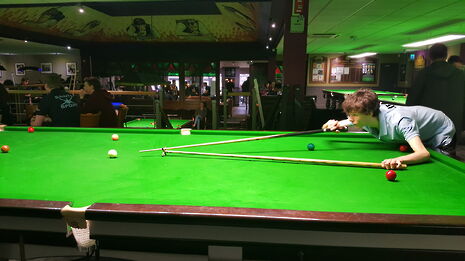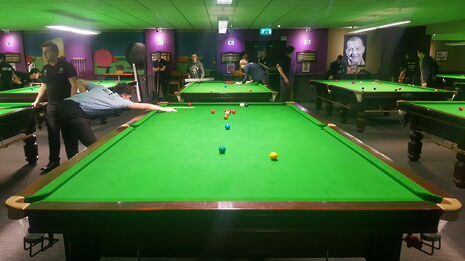Cambridge secure unexpected snooker triumph
Cambridge defeated hot favourites Sheffield at the BUCS Team Shield match in Leeds

In a historic moment for cue sports at the University, first-time entrants Cambridge caused a seismic shock at the Northern Snooker Centre in Leeds last Sunday, as they pipped favourites Sheffield to the Team Shield BUCS title.
In a fairytale run to the final, the five-strong team of captain Andrew Derrett, Phil Durkin, and Robinson trio Dylan Sidle, Alex Fisher and Henry Phillips defied the odds to claim a 3–2 victory in a tense final.
Representing a first national title of any description in a cue sport for the University, this achievement is made even more impressive by the fact that the snooker side of the Cambridge University Pool Club (CUPC) has only existed in any organised degree for mere months.
Having never appeared at a BUCS event before, and with 42 other teams involved in the competition, no one saw the plucky debutants returning home with the title.
In the first round of the straight knockout individual tournament, four of those in Light Blue met their demise early on. Derrett, Sidle, and Fisher all went out in very close frames, most being decided in the final few colours, where their opponents’ superior decision-making proved critical.
And so it was left to Durkin and Phillips to fly the Cambridge flag in the individual competition. Durkin scraped past his weaker opponent, but Phillips put in a great performance to go through, putting in a high break of 34 along the way.
The team event began soon after, with five groups of five teams, the top three of each going through to the knockout stages, as well as the best fourth-placed team.
Expectations were understandably low, and the first match against Birmingham ended as a tense 5–5 draw, with a point gained each. Skipper Derrett did well to force a re-spotted black by potting blue, pink and black, but eventually surrendered the frame with honours even.
Fears of being out of their depth were rubbished in the next match-up, where a confidence-building 7–3 win was secured against Leicester. Fisher went down 2–0 against one of the best players in the competition, but Durkin, Sidle and Phillips were rarely troubled in comfortable victories. Derrett looked to have little chance against his opponent, having watched a wonderful 62 break effortlessly put past him in the first frame, but somehow managed to grind out a draw by claiming the next.
The day ended with a frustrating 7-3 loss against the Sheffield II teams. Despite being evidently technically superior, it was only Sheffield’s match play and experience that saw them over the line in a broadly low-quality affair.
So while progression to the knockouts seemed poised on the next day’s crunch match against Oxford, Durkin was still doing the team proud in the individual event. He claimed successive 2–1 wins with excellent tactical play on the way to reaching round four.
If day one was about finding their feet, the second day was clearly more important. The biggest disappointment came with the 7–3 loss against Oxford. Fisher played excellent snooker to win 2–0, but the rest of the team was well below par, as Derrett once again forced and lost a dramatic re-spot.
The team was then left to sweat on the remaining results, and eventually progression was confirmed in their group on frame difference over Birmingham, before Durkin’s impressive singles run was ended.
Seeded 14 in the last 16, Cambridge were rank outsiders against group winners Nottingham Trent.

But the disciplined play from every member was remarkable in such pressurised circumstances. In truth, Trent were never in the contest, and Sidle potted the pivotal pink to take the underdogs further than anyone could have predicted.
The miraculous run was only just beginning. Exeter III were their quarter final opponents, capturing the imagination of a packed-out crowd. In a mix-up of the playing order, Durkin opened proceedings with an unusually nervy performance, but Fisher was hitting his stride, levelling things up soon after. Sidle and Phillips therefore knew that one victory between them would take the team into the semis.
Sidle, as ever, ground out a hard-fought 1–1 draw, proving hard to beat for the whole weekend. And after Phillips cruised his first frame and went well ahead in the second, the finish line looked close, only for a swift clearance from Exeter to level things up once again.
Derrett would have been expected to win his rubber comfortably, but was shocked in the first frame by a barrage of punishing long pots. The final frame was, however, expertly negotiated, hardly giving his opponent a sniff as the captain dramatically pegged back Exeter to a 5–5 tie.
A play-off frame was thus required. Derrett nominated himself to do the honours in the shootout, and this was a nerveless performance, a stunning long brown closing an ice-cool performance which he controlled from the outset.
Whispers of an impossible triumph were growing louder. Bristol I in the semi-final, much stronger on paper, were undoubtedly afraid of relative unknowns Cambridge. Durkin struggled again, but Derrett crushed his opponent with a marker-laying win. Sidle, Phillips and Fisher picked up vital frames each, the latter of whom cut in the deciding black in a crucial moment.
So another play-off was required, and this was a real captain’s performance from Derrett once again. In a rare lapse, he left the door ajar for his opponent to clear up and clinch what would have been a cruel victory, but a poor positional shot on the blue left him needing the rest on a difficult pink.
The pink was left pot-able, but far from easy, not least given that a spot in the final depended on just the two remaining colours. Derrett sank the pink, with the white drifting agonisingly dead-straight on the black.
Left with no option but for a slow roll on the black to prevent an in-off, Derrett potted the final colour to take his team to a remarkable debut final.
Opponents Sheffield I, huge favourites, were expected to be a bridge too far in the best-of-five final. Members of the fierce team had made century breaks in their history, with one playing for the Indian national side.
But Sheffield were jittery, having only reached the final on a bye. Derrett opened proceedings by nabbing the first frame against a player who knocked in regular 50 breaks. But his opponent eventually proved too strong, winning the rubber 2–1. Phillips suffered a similar fate, clearly better among the balls but starved of chances as Cambridge went down 2–0.
But a stunning comeback was sparked by Fisher, who never looked troubledt. Sidle won his first frame, profiting from an in-offed black ball in a marathon frame.
Things were looking down in the next, only for Sidle to play an inspired shot, ramming in a blue tight along the rail, with the white cannoning into the pink and black, releasing both, which he duly potted. It was a miraculous shot, and was perhaps the turning point where the trophy came into sight.
And so it was left to Durkin, to clinch the final rubber. This was an impressively controlled performance against the Sheffield skipper, perfectly content to refuse pots to put his opponent in all kinds of trouble. When a bedraggled captain sent the white into the pocket on the final pink, the unlikely victory was secured.
Disbelief greeted the final moments, as most of the venue couldn’t believe the sort of upset they’d just witnessed. When the team collected their BUCS gold medals and shield title it felt as though this victory could represent a seismic shift in the scale of the sport at the university. Snooker and pool appear to have an exceptionally bright future
 Interviews / ‘People just walk away’: the sense of exclusion felt by foundation year students19 April 2024
Interviews / ‘People just walk away’: the sense of exclusion felt by foundation year students19 April 2024 News / Controversy on the Cam: John’s spend almost 90 times more on rowing than other colleges19 April 2024
News / Controversy on the Cam: John’s spend almost 90 times more on rowing than other colleges19 April 2024 Theatre / The closest Cambridge comes to a Drama degree 19 April 2024
Theatre / The closest Cambridge comes to a Drama degree 19 April 2024 News / Emmanuel College cuts ties with ‘race-realist’ fellow19 April 2024
News / Emmanuel College cuts ties with ‘race-realist’ fellow19 April 2024 News / Corpus student left with dirty water for over six months21 April 2024
News / Corpus student left with dirty water for over six months21 April 2024





